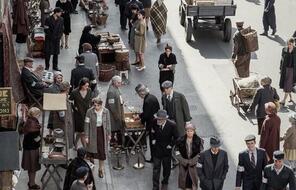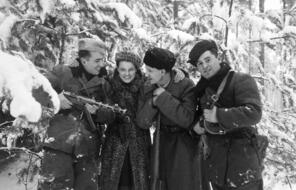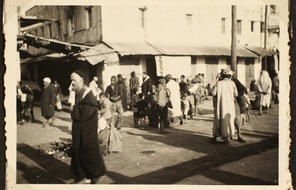Vitka Kempner’s Biography
At a Glance
Language
English — USSubject
- History
- The Holocaust
- Resistance
Vitka Kempner was born in Kalisz, Poland, on the Polish-German border, in 1922. When she was 17, Kalisz fell to Germany in the first days of the war. Sensing danger, Vitka escaped and made her way to Vilna, which, like much of Eastern Europe, was controlled by the Soviet Union. Her move went against the lessons of history, as during World War I the Germans were benign occupiers and the Russians far more cruel, and for more than 150 years movement to the west was toward greater safety and freedom. When Operation Barbarossa, Germany’s attack on the Soviet Union, was launched in 1941, Vilna was occupied, and the Jews were forced into a ghetto.
In the ghetto, Kempner joined a chapter of Hashomer Hatzair, a Zionist youth group. Under the leadership of Abba Kovner, the group transformed into a resistance cell called the Avengers, which would go on to become one of the most famous and most successful all-Jewish partisan units during the war. Kovner had heard from a witness about the Nazis’ massacre of Jews in nearby Ponary, a former retreat area in the forest. While most of those in the ghetto believed that Ponary was a labor camp, Kovner thought that the Ponary killing center was not an isolated action but part of a larger system of mass murder. The Avengers were determined to do everything they could to fight back. In a manifesto encouraging Jews to resist, Kovner wrote, “The only reply to a murderer is resistance. Brothers, it is better to die as free fighters than to live at the mercy of killers. Resist, resist, to our last breath."
Kovner and others, including Vitka Kempner, organized the Jewish resistance efforts into a larger collective called the FPO, the United Partisan Organization. Vitka was responsible for the FPO's first act of sabotage, smuggling a homemade bomb out of the ghetto and blowing up a Nazi train line. Vitka and other FPO members began smuggling weapons through the sewer system. Over time, Vitka became one of Kovner’s chief lieutenants.
After a thwarted uprising, Vitka helped the FPO to evacuate much of the population through the sewer system to the surrounding forests. Several of the escapees became soldiers in their unit. From hiding, the Avengers continued their sabotage operations, destroying both the power plant and the waterworks of Vilna, the city they once loved.
As the Soviets advanced westward, the Avengers emerged from the forest and helped liberate Vilna. But the liberation of their country and the German defeat were not enough. Vitka and Kovner wanted revenge. In one of their boldest—and most morally questionable—actions, Kempner snuck into the bakery at the Stalag 13 POW camp for German SS officers and laced 3,000 loaves of bread with arsenic. According to British journalist Jonathan Freedland, an Associated Press report from 1946 indicated that 1,900 German POWs became sick.
Vitka Kempner and Abba Kovner married after the war, but their work did not end. They continued to look for ways to avenge Jews killed by Nazis, and the couple also reached out to the survivors to help smuggle hundreds of European Jews into British-occupied Palestine. The couple moved to Palestine themselves in 1946, settling at Kibbutz Ein Horesh, where they raised two children. Vitka Kempner passed away in February 2012 at her home in Israel, two and a half decades after her husband’s death. 1
- 1Adapted from the Jewish Partisan Educational Foundation.
How to Cite This Reading
Facing History & Ourselves, "Vitka Kempner’s Biography," last updated May 12, 2020.
This reading contains text not authored by Facing History & Ourselves. See footnotes for source information.











